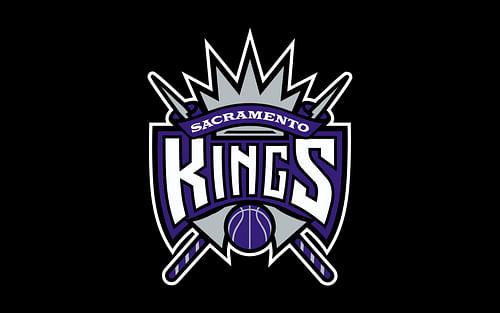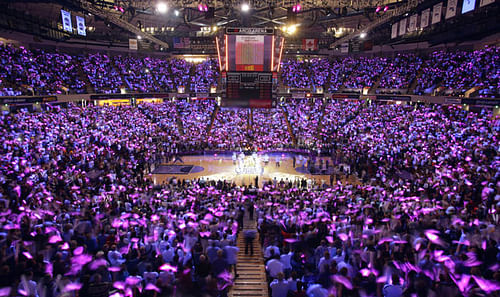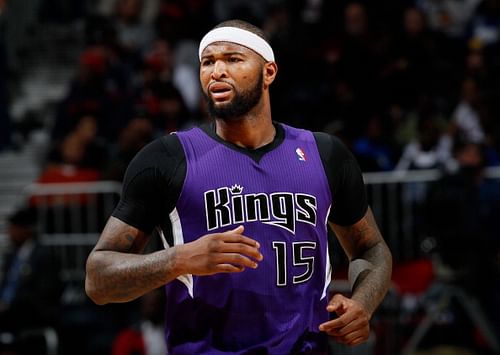
How the Sacramento Kings will rise in the NBA

The Sleep Train arena is back on the map with the Sacramento Kings off to one of their best starts in years. Not since Vlade Divac and team contested for top honours in the early noughties, has the erstwhile Arco Arena been so noisy, justifying the loudest indoor arena record it owns. Though the hot 9-5 start to the season has tapered off a bit, coinciding with a multi-game absence for DeMarcos Cousins, it is still an exciting time to be a Kings fan with plenty of hope and promise in store for the upcoming few seasons.
Here is a fan’s view of what has brought this exciting state of affairs:
The club’s sale meant the Kings didn’t change stadiums

April 18, 2013: From the nosebleed section of a jam packed Sleep Train Arena, I witnessed the Kings experience a narrow loss to the Clippers in the season’s home finale. I repeatedly tried to fight the sinking feeling that it might be the last time the team in purple would play in Sacramento, before bee-lining to Seattle.
The crowd was out in full force, cheering every play interspersed with frequent appeals for the team to stay in Sacramento. After an emotionally charged game, I left the arena thinking that I was part of history with a sad feeling that it might be the last time I see the Kings in Sacramento. The Maloof brothers, the owners of the Kings were looking to sell and the most likely destination was Seattle.
May 28, 2013: The NBA board of governors approved the sale of the Kings to Vivek Ranadive, ending speculation that the Kings would move out. Even more good news arrived when the plans for building a new downtown arena, with bigger capacity and a more central location, were announced. My relief knew no bounds at hearing this news and I looked forward to the upcoming season.
Recent decisions point to a bright future
Once the initial euphoria of retaining the Kings died down, the 2013-14 season saw a continuation of the mediocre form from the year before, with the Kings finishing with an identical 28-54 record, renewing their membership in the mediocrity league. It looked like the problems from before; the immaturity of its star (Cousins), lack of shooting/shot creation, inadequate depth in key positions; would continue plaguing this franchise.
However, there were a few key decisions which are now bearing fruit. Firstly, Demarcus Cousins (Boogie) was signed to a 4-year, $62-million extension which prevented one of the most promising, dominant big men from entering the free agency for another four years. Coach Mike Malone, the chief architect of Golden State’s defensive schemes, was hired as a definite upgrade on the strategically pedestrian Keith Smart.
Additionally, the elephant in the room, Rudy Gay’s monster contract ($20 million), extending into the 2014-15 season was acquired in December, hamstringing the flexible cap space. While this trade for the overpriced, ball hogging, inefficient shooting star cannot be defended, due credit must be given to the Kings for tying him down to a further 3-year, $42-million extension. Gay’s need for security has benefited the Kings as they get a reliable scorer just entering his thirties, at a bargain price.
Having finished the 2013-14 season firmly entrenched as the bottom-feeders of the Western Conference, there were grumblings in many quarters when the season’s best player, point guard Isaiah Thomas (20.3 points, 6.3 assists) was traded to the Phoenix Suns in a sign and trade. This seemed to indicate a lack of ambition and cohesion by the owner.
This vacuum at point guard was duly addressed by signing free agents Darren Collison and Ramon Sessions providing depth. The need for more three-point shooting was addressed by the savvy draft selection of Nick Stauskas to provide competition to Ben Mclemore at shooting guard. For the first time in many years, it looked like the Kings had a plan in the offseason.
DeMarcus Cousins has been influential

Known primarily for being a polarizing bundle of talent and potential in a mediocre Kings team, it has often been easy to overlook Demarcus Cousins’ enormous set of skills, soft touch and nifty footwork, in a league which is steadily declining in the amount of dominant big men. Needless to say, the Kings’ strong start has been directly related to Cousins’ jump in offensive and defensive acumen as the offense is primarily funneled through him.
Playing in the low block, the 6 foot 11 in’ Cousins, is displaying dominant form, averaging 23.5 PPG and 12.6 RPG while going to the free throw line about 8 times a game. While the raw numbers are not so different from last season, the Kings are primarily benefiting from his passing from double team situations and improved defence, as he has reduced his usual lazy swipes leading to cheap fouls.
In a team lacking reliable outside shooting, defenses routinely converge on Cousins. He has acquitted himself well in these situations by using his immense physicality and second shot skills, where he follows up on his missed shot, to find scoring opportunities. In addition, he seems calmer and more mature this season. A quick glance at the Kings’ form chart without Cousins (4 straight losses) is all that is needed to illustrate his importance.
Sacramento with ‘Boogie’ will improve in the NBA
Small market teams always find it difficult to attract stars and rebuilding a team from the depths to which the Kings plummeted, is always a monumental challenge. In Cousins, Gay, Collison and Stauskas, the Kings have a promising core which can challenge for a playoff spot next year, if not this year.
Due to the young core finding its feet, we are likely to see an inconsistency – leads blown in spectacular fashion or oppositions routed at home. However, we can be sure of one thing – “Boogie” is the new tune all defenders in the league will be dancing to and it’s happening here in Sacramento!